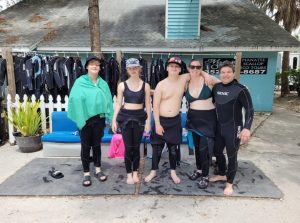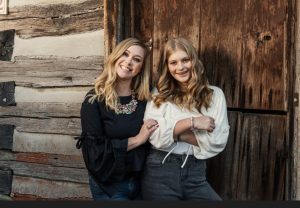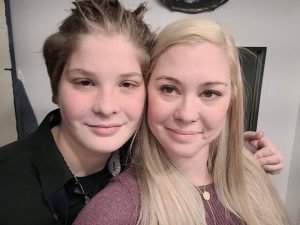Blog
Annaruth Diller has three children. Fourteen-year-old twin boys, Alan and Blake, and a thirteen-year-old daughter, Cianah. She describes Alan as “creative, kind, and artistic.” Blake is “engineering-minded” (he built his own electric bike) and is “compassionate.” And Cianah? She’s “focused and driven,” dances competitively, and like the rest of Annaruth’s children, she’s creative.
When I asked Annaruth if she always knew she wanted to be a mom, she paused before answering. “Yes…and no,” she said. “I love and adore my children.” Then she laughed, “I’d even say I’m obsessed with them. I can’t imagine my life without them.” But beginning when she was a baby, she got unexplained fevers. By the time she was fourteen, she had been in and out of doctors’ offices and hospitals. There was something off, but no one could quite pinpoint it. So, did she want to be a mom? Yes. But there was something unnerving not far beneath the surface: what was going on in her body?
By September 2021, when Annaruth was in her early thirties, she was struck with horrible neck pain, near her thyroid. Her dad had died from cancer at 39. In fact, cancer had plagued her whole family. She thought she was sure what was coming: thyroid cancer. Instead, the doctor’s diagnosis gave her a shock: she had a carotid artery occlusion, not from cancer, but vasculitis. Takayasu arteritis, to be exact.
“I was scared to death,” she said, of receiving the news. “I couldn’t process it. To some degree, I still haven’t processed it.” Her medical mystery was finally solved, but her life – and the way she imagined motherhood – was about to change.
 Annaruth is close with her kids. “I’ve really invested in building a relationship where we’re all honest with each other and we can be open and trusting.” So when she came home with this new diagnosis, she wasn’t about to hide it. She invited them into the journey. “I asked them: how much do you want to know? I let them choose the level of knowledge they felt comfortable with.”
Annaruth is close with her kids. “I’ve really invested in building a relationship where we’re all honest with each other and we can be open and trusting.” So when she came home with this new diagnosis, she wasn’t about to hide it. She invited them into the journey. “I asked them: how much do you want to know? I let them choose the level of knowledge they felt comfortable with.”
For the most part, they wanted to know everything at first. “So I explained everything,” Annaruth said. “I was very honest about what the disease is, what treatment looks like, about moving forward, though we didn’t have a lot of answers and that was hard.” But as time has gone on and the doctors have yet to find a way to successfully manage her disease, Alan and Cianah have wanted to know a little less.
“It’s tough for me. It’s tough for them. There’s been a lot of crying and anger. We’re kind of getting to the point that they need more breaks from me, they tend to not want to be home as much. It’s hard for them to see their mom like this.” Annaruth explained that there are days where, by the time she gets to the end of it, she can’t get up the steps. “So my husband and one of the boys have to help me or carry me upstairs.”
Annaruth went on, “There are days where I can’t be their mom. It’s really pushed them to have to grow up and be more independent. They just want their mom back. And I just want to be back.”
When Annaruth became a mom at 19, she knew the kind of mom she wanted to be. “I am highly involved and want to be.” But, in the past two years, she’s had to step back. “It hurts,” she confessed. “It’s a lot of grief and anger.”
And guilt. She knows the guilt is not fair, that she didn’t choose to be sick. Still, she can’t help but feel it. “I feel guilty because I don’t know if I’m going to be here for them in the future. I brought them into the world and now I’m like, ‘I’m so sorry, I’m so sick. And I can’t take care of you.’”
She feels a deep sense of loss. “One day, I was up and active and being able to be a mom and the next thing I knew, it feels like, some days, I’m not supposed to be a mom.” Some days, she feels “vasculitis stole everything from me.”
 Her and her children’s feelings of loss are real. Annaruth doesn’t want to gloss over them. And, yet, what I loved about talking with her is that, within her, she carries a tremendous awareness and aliveness. She’s not giving in or giving up. Even in darkness or uncertainty, there is love.
Her and her children’s feelings of loss are real. Annaruth doesn’t want to gloss over them. And, yet, what I loved about talking with her is that, within her, she carries a tremendous awareness and aliveness. She’s not giving in or giving up. Even in darkness or uncertainty, there is love.
When she talks about her children, their resilience rises to the surface. Even from this unbidden circumstance, they have grown. “My daughter wants to be a doctor,” Annaruth said. “She tells me she wants to do research to find a cure for me.” Her son Blake, who was already so sensitive, has grown in his superpowers of tenderness and caring. “My blood flow to my arms is affected, so he’s always quick to grab my purse. If he sees I’m going to stand up, he is automatically at my side. I don’t even have to ask.” And Alan – “he’s the kind of kid who’s always making friends with everyone, who’s always trying to include the new kid.” His empathy continues to blossom.
“I read an article” – here, Annaruth paused to laugh and add, “My kids are always teasing me about finding everything in an article.” She read an article saying it takes 30 seconds for a hug to work and start regulating your system. “So Alan and I do that for each other when we’re having a hard day.”
Vasculitis and all, she has raised kind-hearted children, exactly what the world needs.
Motherhood has grown her, too. When I asked Annaruth what being a mother has taught her, she paused, then said, “Everything.”
“I was the most impatient person ever,” she said. “Really.” But motherhood has taught her patience, calmness, and compassion. “I grew up with a mom who was very angry; she had a tough life and then lost her husband. She was completely overwhelmed. I didn’t know how to be a compassionate, loving mom.” But, with grace and trust and time, she has grown into it. And the revelation? It was always within her.
 As we were closing our conversation, I asked Annaruth what message she had for other moms living with vasculitis. In reply, she told me a story.
As we were closing our conversation, I asked Annaruth what message she had for other moms living with vasculitis. In reply, she told me a story.
A few years ago, Annaruth attended Wanderlust, a big, outdoor yoga festival, in Philadelphia. One of the teachers said something that clarified her journey. Describing life like a yoga practice, the teacher said, “Right now, it’s like this. It doesn’t mean it’ll get better, but it’ll change. Like in yoga, maybe it’s to another difficult position. But you won’t have to hold it forever.”
To Annaruth, those lines were illuminating. You don’t have to hold it forever. She got the whole saying tattooed on her arm. In fact, what she wants her kids to learn from this experience is to “suffer well.” This isn’t toxic positivity, she insisted. It’s accepting where you are “right now” and loving yourself in the moment. “It’s tough to grow up,” she said. “There’s so much bullying, racism, sexism, whatever it is. But as a parent, you can be a beautiful example of acceptance and self-love.”
Despite this being a path neither she nor her family asked for, Annaruth knows, with enough love, with enough trust, and with enough 30-second hugs, the kids are going to be alright.
Author: Ashley Asti
